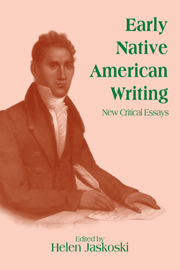Book contents
- Frontmatter
- Contents
- Foreword
- Preface
- List of Contributors
- 1 “Honoratissimi benefactores” Native American students and two seventeenth-century texts in the university tradition
- 2 “Pray Sir, consider a little”: Rituals of subordination and strategies of resistance in the letters of Hezekiah Calvin and David Fowler to Eleazar Wheelock
- 3 “(I speak like a fool but I am constrained)”: Samson Occom's Short Narrative and economies of the racial self
- 4 “Where, then, shall we place the hero of the wilderness?”: William Apess's Eulogy on King Philip and doctrines of racial destiny
- 5 “They ought to enjoy the home of their fathers”: The treaty of 1838, Seneca intellectuals, and literary genesis
- 6 “I am Joaquin!”: Space and freedom in Yellow Bird's The Life and Adventures of Joaquin Murieta, the Celebrated California Bandit
- 7 “This voluminous unwritten book of ours”: Early Native American writers and the oral tradition
- 8 “A terrible sickness among them”: Smallpox and stories of the frontier
- 9 “A desirable citizen, a practical business man”: G. W. Grayson – Creek mixed blood, nationalist, and autobiographer
- 10 “An Indian … An American”: Ethnicity, assimilation, and balance in Charles Eastman's From the Deep Woods to Civilization
- 11 “Overcoming all obstacles”: The assimilation debate in Native American women's journalism of the Dawes era
- 12 “My people … my kind”: Mourning Dove's Cogewea, The Half-Blood as a narrative of mixed descent
- 13 “Because I understand the storytelling art”: The evolution of D'Arcy McNickle's The Surrounded
12 - “My people … my kind”: Mourning Dove's Cogewea, The Half-Blood as a narrative of mixed descent
Published online by Cambridge University Press: 20 February 2010
- Frontmatter
- Contents
- Foreword
- Preface
- List of Contributors
- 1 “Honoratissimi benefactores” Native American students and two seventeenth-century texts in the university tradition
- 2 “Pray Sir, consider a little”: Rituals of subordination and strategies of resistance in the letters of Hezekiah Calvin and David Fowler to Eleazar Wheelock
- 3 “(I speak like a fool but I am constrained)”: Samson Occom's Short Narrative and economies of the racial self
- 4 “Where, then, shall we place the hero of the wilderness?”: William Apess's Eulogy on King Philip and doctrines of racial destiny
- 5 “They ought to enjoy the home of their fathers”: The treaty of 1838, Seneca intellectuals, and literary genesis
- 6 “I am Joaquin!”: Space and freedom in Yellow Bird's The Life and Adventures of Joaquin Murieta, the Celebrated California Bandit
- 7 “This voluminous unwritten book of ours”: Early Native American writers and the oral tradition
- 8 “A terrible sickness among them”: Smallpox and stories of the frontier
- 9 “A desirable citizen, a practical business man”: G. W. Grayson – Creek mixed blood, nationalist, and autobiographer
- 10 “An Indian … An American”: Ethnicity, assimilation, and balance in Charles Eastman's From the Deep Woods to Civilization
- 11 “Overcoming all obstacles”: The assimilation debate in Native American women's journalism of the Dawes era
- 12 “My people … my kind”: Mourning Dove's Cogewea, The Half-Blood as a narrative of mixed descent
- 13 “Because I understand the storytelling art”: The evolution of D'Arcy McNickle's The Surrounded
Summary
Gerald Vizenor, in his book Earthdivers, uses the term “mixed descent” as a symbolic category, moving beyond heredity to describe a strategy of discourse that promotes transformation. Bringing mixed descent to discourse undermines the modes of speech and thought that Vizenor calls “terminal creeds,” that is, fixed, dogmatic beliefs or modes of expression that do not allow for ambiguity or change. The mixed-blood heroes of Vizenor's stories explode terminal creeds by their constantly shifting positions and discourses. Through figures that challenge boundaries, overturn expectations, and commit social offenses, and through narratives that break down genres and commit literary offenses, Vizenor opens a way for transformation. His concept allows for the expansion of mixed descent from a social and biological fact to a literary and cultural construct, thereby challenging readers to see mixed blood as a basis for a new literature rather than as a reason for questioning the “authenticity” of writings by Native Americans.
Vizenor's symbolic mixed descent is useful in understanding Mourning Dove, her novel, Cogewea, the Half-blood: A Depiction of the Great Montana Cattle Range, and her relationship to Lucullus Mc; Whorter, the white amateur historian who collaborated with her to produce that text. An expanded conceptualization of mixed descent helps one appreciate the complexity of a novel that at first glance appears to be a simple Western romance. Moreover, following Vizenor and using mixed descent as a metaphor enriches interpretation of Cogewea by creating a central place for the collaboration between Mourning Dove and McWhorter within the analysis.
- Type
- Chapter
- Information
- Early Native American WritingNew Critical Essays, pp. 204 - 222Publisher: Cambridge University PressPrint publication year: 1996



